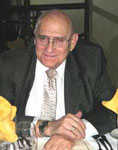Lessons Learned
Author: Linda J. Popky

Martin (Marty) Popky Obituary
This issue is a bit different than our normal newsletter. As many of our readers know, I recently lost my father, Marty Popky, following a long, extended illness. As we’ve had the opportunity to connect with friends, family, and acquaintances over the last several weeks, we’ve been reminded not only of his many accomplishments but also the way he lived his life.
My dad was a businessman and an entrepreneur. Not only did he start and run several businesses, but he also founded and supported a variety of nonprofit organizations, and he dedicated countless hours on an ongoing basis to helping others less fortunate.
I’ve collected a few of the lessons learned that are relevant to many of us in the business world today.
Be ahead of the crowd.
Sometimes you may be way ahead of the curve. No one talked about disability rights in the 1950s when my dad helped form the Blind Bowlers Association, or about low-income housing for the elderly in the 1960s when he lobbied Congress for funding. Don’t wait for a cause to become popular. If you find something that needs to be done, go out and do it.
Don’t give up easily – find alternatives.
If you can’t get from Point A to Point B directly, you might need to find an alternative route. Or someone to help plead your case. Or another way to get people to act. Whether it was helping a customer obtain hard-to-get insurance coverage or lobbying the US Dept. of Housing and Urban Development for needed concessions on low-income elderly housing, my father was not deterred by a negative response. That just meant he went back and found another way to approach the problem and present the situation differently, sticking with it until he was able to meet the goal. If at first you don’t succeed, stick with it. Try alternative approaches until you find the one that works.
Treat people well.
In an age when it’s not unusual for people to have new jobs every couple of years, it’s amazing that my dad had several employees who were part of his business for three and four decades. That’s because he treated his employees well and made sure they were valued members of the team. When given the opportunity, he always erred on the side of overcompensating, not undercompensating. He made sure to give his people the benefit of the doubt and it was very, very rare that anyone ever took advantage of him. Walk the talk and show people your actions are consistent with your words.
Do the right thing.
I was touched by the woman who told us she had gone to high school with my father. At the time she had a bad speech impediment and most people made fun of her – except for my dad, whose kindness she still remembered some 60+ years later. Doing the right thing isn’t always the most popular choice, but it could significantly impact someone else’s life.
Make the special seem ordinary.
Growing up, I didn’t realize there was anything special about my dad’s volunteer work and civic involvement. I thought every businessman went out to help his customers late at nights on weekends, and gave of his time generously and unfailingly to multiple charitable organizations. I didn’t realize this was out of the ordinary, because he never made a big deal about it. Do what needs to be done without drawing excessive attention to yourself.
Keep your sense of humor.
Even as his memory failed, my dad was sure to make jokes with the nurses and aides who cared for him. Not only did it help defuse many difficult situations, but the best caregivers actually requested to have him as their patient because they enjoyed interacting with him. No matter what happens around you, remember that a little humor will go a long way.
The sooner you get done, you’ll be done.
This has been a favorite saying in our family for years. We all have tasks or jobs we don’t particularly like or would prefer not to have to do. The sooner you start these less-than-exciting activities, the sooner you’ll have them finished, behind you, and be able to move on. And it’s a great feeling to know that the sooner you get done, you’ll be done.




